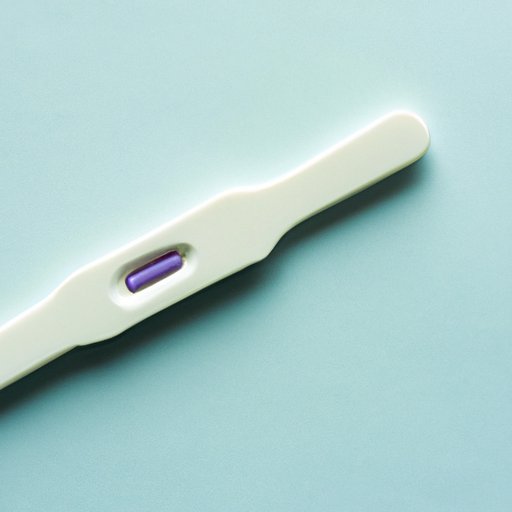
Introduction
If you have decided to start a family, you may have questions about the effect of an intrauterine device (IUD) on your fertility. An IUD is a small, T-shaped birth control device that is inserted into the uterus. It is a popular method of birth control because it is highly effective, long lasting, and reversible. If you have recently had your IUD removed, you may be wondering if pregnancy is possible as soon as one week after removal. In this article, we will explore the science behind IUDs and conception, debunk common fertility myths, and provide tips for couples who are trying to conceive after IUD removal.
Fertility After IUD Removal: What You Need to Know About Getting Pregnant in the First Week
IUDs work by preventing fertilization of the egg by the sperm or by preventing implantation of a fertilized egg in the uterus. The hormone-releasing IUDs also thicken the cervical mucus, making it more difficult for sperm to reach the egg. After removal of an IUD, the contraceptive effect wears off quickly, and the body quickly begins to transition back to its natural hormonal balance.
It is possible to get pregnant immediately after removal of an IUD. The uterus is typically very receptive to pregnancy after IUD removal, and the chance of conception is high for the first few weeks following device removal. However, it is important to remember that each woman’s fertility timeline is unique and there are several factors that can affect the chances of getting pregnant after IUD removal.
The Science behind IUDs and Conception: How Long Does It Take to Get Pregnant after IUD Removal?
Several factors can affect post-IUD fertility, including age, overall health, and the type of IUD used. Research suggests that most women will return to their baseline fertility level within the first month following IUD removal. Factors such as age, pre-existing medical conditions, and lifestyle factors can also impact how quickly a woman’s body returns to its natural ovulation cycle.
According to a study published in the Contraception journal, approximately 50% of women become pregnant within 3 months after IUD removal. The likelihood of pregnancy is highest in the first month after device removal. Within the first week, it is less likely but still possible for conception to occur.
Planning for Parenthood: Tips for Couples Trying to Conceive After IUD Removal
If you are looking to start a family after IUD removal, you may benefit from some preconception planning. This can involve taking steps to optimize your overall health, including stopping unhealthy habits, adjusting your diet, and taking supplements. Women should also consider tracking their menstrual cycles to determine ovulation days and time intercourse accordingly. It’s important to speak with a healthcare provider before trying to conceive to ensure optimal health and a successful pregnancy outcome.

Fertility Myths Debunked: The Truth About Getting Pregnant One Week After IUD Removal
There are several myths and misconceptions surrounding fertility after an IUD removal. One common misconception is that it takes a long time to regain fertility after device removal. However, as previously noted, most women return to their baseline fertility level within the first month after IUD removal.
Another myth is that the IUD can cause infertility, but this is not true. While the device may temporarily impact fertility, it does not cause permanent damage to the reproductive system.
It is important to seek out accurate information about post-IUD fertility to help manage expectations and ensure a healthy conception journey.
The Emotional Rollercoaster of Fertility: Coping with the Uncertainty of Conceiving After IUD Removal
The journey to conception can be emotionally challenging, especially if the process takes longer than expected. Many women experience stress, anxiety, and depression when attempting to conceive. It’s important to stay positive, focus on self-care, and seek support when necessary. There are several resources available, including fertility support groups, counseling, and online communities.
Natural Family Planning Methods: Ways to Track Your Fertility After IUD Removal
Many women turn to natural family planning methods as a way to track fertility after IUD removal. These methods can include tracking basal body temperature, cervical mucus, or using an ovulation prediction kit. These methods can be effective in helping identify the best time for intercourse. However, it is important to note that natural family planning methods are not foolproof and have a higher failure rate than traditional birth control methods.
Fast Facts: What You Need to Know About Your Chances of Getting Pregnant After IUD Removal
Here are some key takeaways:
- IUDs can affect fertility while they are in place, but fertility typically returns to normal after removal.
- You can get pregnant as soon as one week after removal of an IUD.
- Most women will return to their baseline fertility level within the first month after removal.
- Preconception planning can help optimize overall health and improve the chances of conception.
- Natural family planning methods can be a helpful tool for tracking fertility.
Conclusion
If you are considering starting a family after IUD removal, it is important to be well-informed about the impact of the device on fertility. While it is possible to get pregnant immediately after removal, post-IUD fertility varies from person to person. Educating yourself on the facts, planning for conception, and seeking support can all help you on your journey to building a family.




